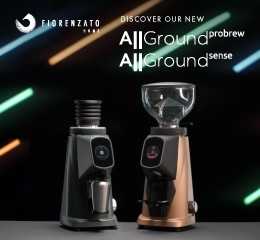MILAN – We spoke with the new World Brewers Cup Champion Carlos Horacio Medina Isamit: micro roaster in his own Colibri Coffee Roasters, at Santiago de Chile and now an example for all future competitors in Latin America.
You started competing in 2018, Was this the second world championship you experienced? What changed from the other attempts?
“The first time I competed was for the barista cup, but because I’m an independent competitor and for baristas you need a huge team, more equipment and money, it was difficult to try again. For me, this time brewers was a better option. Of course, I love the brewed coffee and it was also a better experience, so I’m happy with my decision.
It was more interesting: maybe you have less room to play, but you can act on different aspects like water or texture. You can go way deeper in how you prepare filtered coffee. For me it was easier to try.”
Tell us about the coffee you brought to the competition and what message did you present to the jury?
“I chose a coffee from Colombia, a Sidra variety from Finca Potosì from Café Granja La Eperanza, because I didn’t want to compete directly against the other amazing Geishas. The concept of my routine was based on that coffee and how it can change your life for ever and how serving this coffee to many people could change the coffee market.
I chose a different variety, a different flavour profile.
It was a risk but basically Geishas are good for winning with their great acidities and clean flavours, they fill the scoresheet due to its atributes. But for what I was trying to share with judges and the world, the Sidra was perfect. It was a different experience with a great coffee and it wasn’t safe: everyone elses used some Geishas, and Sidra rappresented my own path.
I had the chance to try here in Chile some Granja Esperanza coffee. Here there’s another roaster that work with them and so I could try other varieties, but I bought their coffee for Melbourne and in that time it was Geishas. Then I started thinking to take something else to the next Worlds, so I talked to them directly, they sent me their catalogue. Luckily a friend of mine gave me 20 grams of Sidra: it was something different from what I was looking for and I really enjoyed it. I bought 3 chilos and that’s how I get to my coffee for competing.
This Sidra has red, purple, floreal attributes and tropical fruits notes. I roasted it darker and I tryed to exctract a little less. That’s because roasting it lighter gave me more acidity but not in a good way. So I roasted a little bit darker and I was lowering about 18% exctraction and that gives me a really balaced cup, with an acidity very well integrated. The sweetness of this coffee is fruity, not caramelized. It was funny because it wasn’t my usual approach. I found in this particular cup that developping a little bit more gave me really interesting notes, like violet for sweet flowers.”
“There was a coffee that I wanted to show and that’s why I lower my extcraction”
“My routine was about how Chile market is growing: the country started working with coffee around 5 years ago. Before that you could only find lower quality coffee and right now you can find many different and new things. Four years ago you had around 20 coffee shops that worked with specialty in Santiago and now they’re around 60. It’s really exploding. The idea in my routine was in sharing about how serving different coffees can change how our country consumes coffee: here in Chile about 95% of the coffee that is consumed is instant coffee. The message was that coffee like Sidra can change how consumers drink coffee. Sharing experience like this can change cup by cup the entire market.”
The fact that you’re a roaster too, has helped in winning the brewers championship?
“Yes. You have more tools available as a roaster. For exemple if someone else would have roasted my coffee, maybe he could have roasted it lighter or darker. I had the chance to modulate the flavour profile from roasting to brewing, I designed my own water. I moved a lot of variables in order to get the result that I was looking for.”
What are the biggest challenges you faced in preparing for the world championship?
“First of all, deferring to Athens was very hard, because the organization here in Chile gave me the money to travel to Australia, but we almost lost all that money between tickets and changes. So when I started thinking about competing in Athen I have around 500 dollars. And the directory from the organization was changing in that moment so they couldn’t help me as much as I wanted. I had to make the decision of managing every costs my self. I was trying to work in my daily job, also doing other activities to raise more money and in the mean time I was training. And I also travelled my self and I had to think about a way to take all my equipments to Athen in only one trip. It was hard.”
And what about the water?
“For the open service you can bring you own water, but in the compulsory you have to use the water provided. In Athens it was really hard to find a good TDS water, all the mineral water in supermakets was around 200 TDS. It was a lot. We bought distilled water, but sometimes when it’s not meant to be consumed, it has plastic notes that we didn’t like: so we had 36 liters and we chose only12 that weren’t contaminated by all those flavours. We were just some crazy guys tasting water.”
And now that you won, the companies decided to support you more for your next projects?

“I have a lot of support. The idea is working to fix all the problems that happened to me and also looking for more sponsorship for the next guy that will want to compete in my category. I’m really happy about it. The fact that I won will open other doors in the next future. I’m already planning the rest of my year, travelling and working a lot more, doing some events with different brands and collaborations.
And also I’m going to restart a project that I had as a roaster: it’s like a small roastery and the idea is that launching back my coffee brand with also a coffee academy. I’m going to share my experience to others in Chile but in general in Latin America that want to compete.
Now I’m going to take a break from competitions, but I would love competing in cup tasters. Next year in Chile is going to have the first roasting competition. But I’m curious also about aeropress.”
What do you think led him to victory instead?
“The coffee was great even if it wasn’t Geisha. The fun things that my coffee scored 90 points and yet competed against 95 points coffees. The coffee was just one part of my winning. I worked really hard, I used a 100 grams roaster to have more chances to profile correctly my coffee. I think also that the semplicity of the routine was something that really was different. I tried to focus on my message and on the coffee experience for the judges.
They had enough time to evaluate, to write down. I tryed to create a more fun experience. I used sensory flavor cups. I used cups that have a particular designed and on the top I used glasses that help to encapsule a lot more of aromas and all of that was envolving for the judges, that weren’t bored. Little things in the routine got the final result.

How I designed my brew bar was important: it was very simple because I wanted to focus on the judges experience. I think that this competition is for the customer experience. I tried to brew as easy as I could. The coffee wasn’t the main thing, I wanted to explain how’s going to be the impact of that coffee. Focusing on customer service and experience more then the brewing the coffee. It was more a coffee conversation.
I trained around 12 months. I got a lot of time. I changed my routine one month before the competition because I was doing something different and at one moment I realized that I wanted to focus only on Chile. I rewrited all the routine and I started to practice again all the service.
I changed things until two weeks before travelling. For finals, I did little things differently in the first round. We tryed to change some words and the timing with lifting and removing but I practiced a lot so I was really confident in working on the go during the routine. I knew the speech and how to do everything. So changing details, wasn’t too hard.
I had to make a lot of meditation excercises. In my mind I was only repeating to my self: jyst think that you’re at home, brewing coffee to your friends.”
Do you think that participating and of course winning these competitions, can change something for coffee in Chile?
“I was born in Venezuela but my mom is from Chile, but I used coffee from Colombia and also I have many friends in Mexico. This winning means a lot for Chile: now a lot brands are now looking to Chile and a lot of coffee producers are trying to sell here. And that’s amazing for our market and it’s an exemple for other countries.
Back in Venezuela they had their first coffee competition for the world championship this year so the next one it will be the first time that they can compete in the world brewers and barista championship.
It’s really cool how it’s going to make a real impact in how people are competing in Venezuela. It’s like Chile has become a little light that inspires the other Latin American countries: we always compete here but not to win because no one ever made it before. So now, after I won it, a lot of friends competing are now willing to try doing it. Now we know that is possible.
Big consumer countries and markets have a lot more knowledge and money to compete. But now, we have more informations, more people from Latin America are travelling to the coffee expos, are learning over Europe and we have platform like Barista Hustle, Coffee Knoledge Hub that makes easier to learn how to brew better and to roast better. The good thing is that we have very good coffees in Latin America and they’re easier to get them. So, when these two aspects get together, you have way more chances to win.
And also, not many people here in producing country and also in Chile can’t speak english, and that could be an obstacle for the speech during competition. Using a translator gets really hard and you have to sacrify a lot of time for your routine. The financial part is another thing that make the difference among Latin America competitors and producing countries competitors.”

















